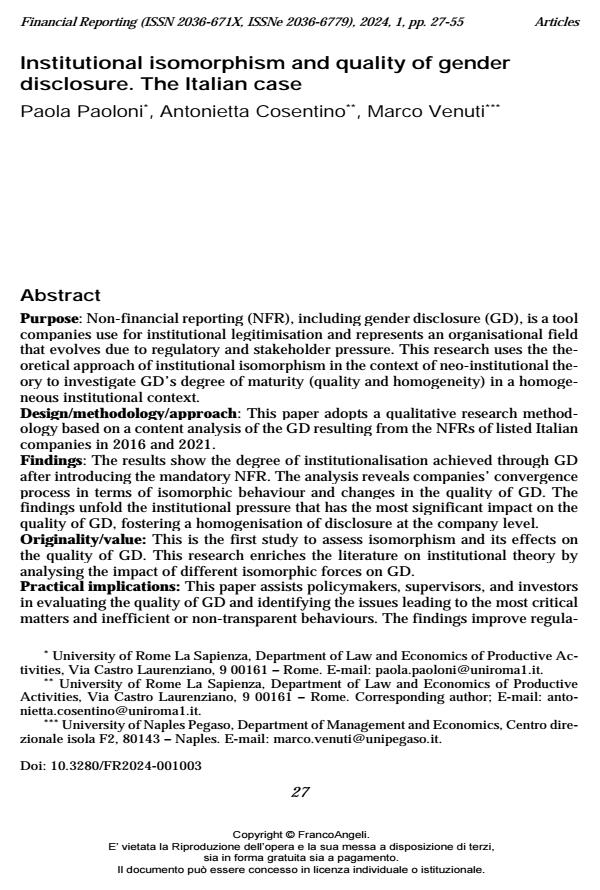Institutional isomorphism and quality of gender disclosure. The Italian case
Titolo Rivista FINANCIAL REPORTING
Autori/Curatori Paola Paoloni, Antonietta Cosentino, Marco Venuti
Anno di pubblicazione 2024 Fascicolo 2024/1
Lingua Inglese Numero pagine 29 P. 27-55 Dimensione file 371 KB
DOI 10.3280/FR2024-001003
Il DOI è il codice a barre della proprietà intellettuale: per saperne di più
clicca qui
Qui sotto puoi vedere in anteprima la prima pagina di questo articolo.
Se questo articolo ti interessa, lo puoi acquistare (e scaricare in formato pdf) seguendo le facili indicazioni per acquistare il download credit. Acquista Download Credits per scaricare questo Articolo in formato PDF

FrancoAngeli è membro della Publishers International Linking Association, Inc (PILA), associazione indipendente e non profit per facilitare (attraverso i servizi tecnologici implementati da CrossRef.org) l’accesso degli studiosi ai contenuti digitali nelle pubblicazioni professionali e scientifiche.
Purpose: Non-financial reporting (NFR), including gender disclosure (GD), is a tool companies use for institutional legitimisation and represents an organisational field that evolves due to regulatory and stakeholder pressure. This research uses the theoretical approach of institutional isomorphism in the context of neo-institutional theory to investigate GD’s degree of maturity (quality and homogenei-ty) in a homogeneous institutional context. Design/methodology/approach: This paper adopts a qualitative research meth-odology based on a content analysis of the GD resulting from the NFRs of listed Italian companies in 2016 and 2021. Findings: The results show the degree of institutionalisation achieved through GD after introducing the mandatory NFR. The analysis reveals companies’ conver-gence process in terms of isomorphic behaviour and changes in the quality of GD. The findings unfold the institutional pressure that has the most significant impact on the quality of GD, fostering a homogenisation of disclosure at the company level. Originality/value: This is the first study to assess isomorphism and its effects on the quality of GD. This research enriches the literature on institutional theory by analysing the impact of different isomorphic forces on GD. Practical implications: This paper assists policymakers, supervisors, and investors in evaluating the quality of GD and identifying the issues leading to the most critical matters and inefficient or non-transparent behaviours. The findings improve regulatory quality, information control, and assessment of the appropriateness and reliability of the NFR. The implications guide regulators in identifying stand-ards and tools that enhance strategies regarding gender diversity and performance disclosure.
Parole chiave:sustainability reporting, gender disclosure, institutional isomorphism, EU Directive 2014/95.
Jel codes:G18, G38, M41, M48
- Mapping Gender Pay Disparities in Chinese Finance: A Systematic Literature and Bibliometric Review Yunhao He, Marcus V. Goncalves, in Administrative Sciences /2025 pp.370
DOI: 10.3390/admsci15090370 - Revisiting the impact of ESG on financial performance: Empirical evidence from the Italian Stock Exchange Michele Bertoni, Paolo Candio, Paola Rossi, in FINANCIAL REPORTING 2/2024 pp.163
DOI: 10.3280/FR2024-002007 - Editorial: Navigating enterprise governance amid global economic disruptions Marco Venuti, in Risk Governance and Control: Financial Markets and Institutions /2025 pp.146
DOI: 10.22495/rgcv15i1sieditorial - Do female auditors affect accruals quality? A replication and extension of Ittonen, Vahamaa, and Vahamaa (2013) Camilla Ciappei, Claudia Frisenna, Diletta Vianello, in FINANCIAL REPORTING 2/2024 pp.77
DOI: 10.3280/FR2024-002004 - Editorial: Corporate governance in times of uncertainty: Emerging insights on ESG, innovation, and board effectiveness Marco Venuti, in Corporate Board: Role, Duties and Composition /2025 pp.4
DOI: 10.22495/cbv21i1editorial - Global Encyclopedia of Public Administration, Public Policy, and Governance Juliana Abagsonema Abane, Moses Cobbina, pp.1 (ISBN:978-3-319-31816-5)
Paola Paoloni, Antonietta Cosentino, Marco Venuti, Institutional isomorphism and quality of gender disclosure. The Italian case in "FINANCIAL REPORTING" 1/2024, pp 27-55, DOI: 10.3280/FR2024-001003